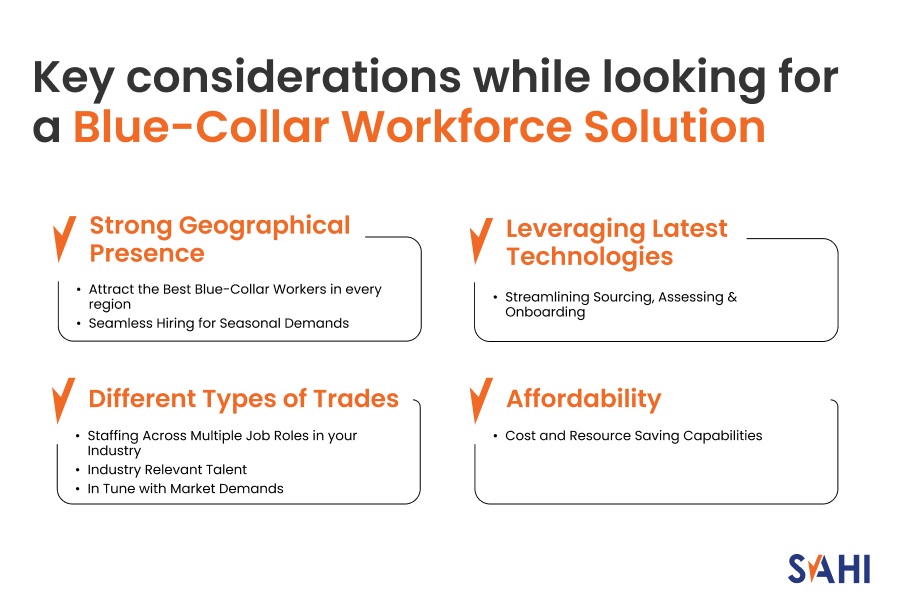In today’s business landscape, companies span across multiple locations, sometimes even straddling international borders. One of the most pressing challenges faced by CHROs, Business Unit Heads, and CEOs is the intricacies and complexities involved in staffing across multiple locations.
This is especially true when the spotlight turns to blue-collar roles. From navigating through cultural differences to confronting logistical bottlenecks, the task of blue-collar recruitment can often appear daunting.
Recruiting for blue-collar roles, which typically involve manual or technical labour, presents a unique set of challenges that differ from white-collar roles. The notion of geographical barriers in staffing is intensified when companies have to tap into the talent pool of regions.
They have to consider the socio-cultural norms, economic conditions, and job expectations that diverge widely from the company’s primary location.
Contract staffing and workforce management have emerged as modern saviours, providing dynamic solutions. It helps you create a workforce that’s suited to your needs and allows companies to overcome staffing barriers better.
But the question remains: how can businesses effectively leverage these staffing solutions to not only bridge the geographical gap but also ensure the recruitment of the right talent?
We will discuss all that and more in this guide.
Why Geography Matters in Blue-Collar Recruitment?
The digital age has made it easier for businesses to extend their reach beyond their home turf. But the human aspect of the operation, particularly blue-collar recruitment, remains rooted to the physical location.
Several reasons account for this:
Cultural Nuances:
Every region has its cultural idiosyncrasies. Understanding and appreciating these nuances are critical when recruiting blue-collar workers who might hold strong regional identities.
Logistical Challenges:
Setting up interviews, conducting skill tests, and finalising the hiring process across different regions can pose logistical nightmares, especially if not streamlined. Moreover, it’s challenging for businesses to continuously source from a particular location without disrupting the normal business operations.
Regulatory Hurdles:
Different regions might have varied labour laws and regulations, making contract employment and standard recruitment processes complex.
Are Modern Staffing Solutions the Way Forward?
The future of successful blue-collar recruitment lies in recognizing these challenges and actively seeking innovative staffing solutions. Approaches like contract staffing offer flexibility and provide a reliable framework to tap into a wider talent pool, ensuring companies find the perfect fit irrespective of geographical boundaries.
Moreover, with the rise of modern workforce solutions, businesses can streamline the workforce management process. It ensures that the entire recruitment journey, from job posting to onboarding, is seamless, efficient, and tailored to the unique needs of each company and geographical location.
If you are thinking about switching to modern staffing solutions, SAHI is the one-stop option for staffing across various job roles. Its 14 years of industry experience has resulted in light-speed hiring and seamless onboarding of the best blue-collar talent in India for all business needs.
What is the Geographical Challenge in Staffing? Navigating Regional Complexities
Navigating the intricacies of the workforce is no easy feat. When businesses expand beyond their home territories, they are confronted with a myriad of challenges that stem from the vast differences presented by each geographical location.
The task of staffing across multiple locations is an intricate dance that requires a fine balance of understanding, flexibility, and strategy. Especially when delving into the realm of blue-collar recruitment, these challenges can intensify.
Let’s dive deep into these geographical challenges and their implications on staffing strategies.
How Cultural Differences Affect Blue-Collar Recruitment?
When it comes to blue-collar recruitment, cultural differences play a pivotal role.
For instance, a blue-collar recruiter might find that the work ethics, expectations regarding punctuality, or communication styles differ significantly from one region to another. These nuances can profoundly influence the recruitment process.
A staffing strategy that works seamlessly in one location might be perceived as insensitive or ineffective in another.
Furthermore, understanding the regional holidays, traditions, and societal norms can be crucial when scheduling work shifts, setting up training sessions, or even during contract negotiations in contract employment scenarios. For businesses, it’s not just about recognizing these differences but also about embedding this understanding into their staffing solutions.
Are Logistical Issues The Tangible Barriers?
While cultural challenges are often intangible, logistical issues present very tangible barriers in staffing across multiple locations. These can range from:
Infrastructure Limitations
Some regions might lack the necessary infrastructure for conducting digital interviews or skill tests. This can impede the speed and efficiency of the recruitment process.
Travel and Relocation
For roles that require relocation or frequent travel, logistical considerations like the availability of suitable accommodation, transportation facilities, and the overall safety of a region become paramount.
What is the Ripple Effect on Staffing Strategies?
The complexities posed by different regions due to cultural and logistical challenges can significantly impact staffing strategies. Companies must be agile, adapting their workforce management practices to cater to the specific needs of each region.
For instance, using modern staffing solutions that integrate technology can help in tailoring job recruitments based on regional preferences. Businesses might consider partnering with local recruitment agencies that have a deeper understanding of the regional talent pool.
What is the Role of Workforce Solutions in Bridging Geographical Gaps? Revolutionising Blue-Collar Recruitment
The age-old challenge of geographical barriers in staffing has been magnified in today’s fast-paced, interconnected world. While these barriers present a unique set of challenges, especially in blue-collar recruitment, the advent of modern workforce solutions offers a promising pathway to seamlessly bridge these gaps.
As organisations strive to tap into diverse talent pools, understanding and leveraging these solutions becomes paramount. Here’s how these innovative solutions are reshaping the way businesses approach staffing across diverse regions.

How to Streamline Recruitment with Workforce Solutions?
In an era of workforce solutions, recruitment processes are no exception. Modern staffing solutions now cater specifically to blue-collar recruitment.
Businesses can build a full-time, part-time, contractual, or temporary workforce, depending on seasonal changes and market demands. Plus, dedicated job boards connect blue-collar workers to relevant jobs.
This ensures both businesses and companies can benefit from innovative recruitment strategies without being limited by state boundaries. Hence, the digital realm is abuzz with possibilities.
For instance, a business looking for an ideal workforce solution can consider the following :
- Strong Geographical Presence
Choose a workforce management solution with a strong local and national presence to attract the best blue-collar workers.
- Different Types of Trades
Top-notch workforce solution systems help businesses staff in various roles so that they can find the right workers across multiple job roles.
- Industry Relevant Talent
The blue-collar workers are in tune with the latest market demands and prove relevant to your business operations.
- Leveraging Latest Technologies
Using the latest technology, businesses can source from a wide talent pool and streamline the onboarding process.
- Affordable
Using workforce management solutions helps in saving cost and resources because access to the best talent becomes easy. Plus, the seamless hiring process depending on seasonal demands ensures business operations aren’t affected by poor staffing solutions.
What is Data-Driven Decision Making?
Data is the new gold, and when it comes to staffing solutions, it’s no different.
For example, if a particular region has a high concentration of skilled electricians, businesses can focus their blue-collar recruitment drives in those areas for maximum results.
Not to mention, they must choose a platform with a solid grasp of the blue-collar talent map in the country for tailored workforce solutions.
How to Embrace Flexibility with Contract Staffing?
Contract staffing, a prominent facet of modern staffing solutions, offers businesses the flexibility they desperately need when navigating geographical barriers. Instead of committing to long-term employment, businesses can leverage contract employment to hire blue-collar workers for specific projects or durations.
This approach not only reduces overhead costs but also allows organisations to adapt swiftly to regional demands and fluctuations.
How to Collaborative Workforce Ecosystems?
One of the standout features of contemporary workforce management tools is their ability to foster collaboration. By integrating various stakeholders – from local recruitment agencies, trainers, logistic partners to the HR team – into a unified ecosystem, these solutions ensure a holistic approach to blue-collar recruitment.
Such collaboration can be particularly beneficial when trying to understand regional cultural nuances, logistical challenges, or specific skill requirements.
Overcoming Geographical Barriers: Strategies for Successful Staffing Across Regions
In the intricate dance of staffing, geographical barriers have traditionally played the role of an unpredictable partner, introducing complex steps and sudden changes in rhythm.
For companies, especially those focusing on blue-collar recruitment, these barriers can often seem insurmountable. However, with the right strategies, backed by modern staffing solutions, companies can not only overcome these barriers but also turn them into opportunities for growth and diversification.
Here’s a look at how businesses can successfully tackle these challenges and the results they can expect.
Local Partnerships & Collaborations
Solution:
By forming partnerships with local recruitment agencies and consultants, companies can tap into a reservoir of localised knowledge. These agencies understand the regional job market, cultural nuances, and logistical challenges better than anyone else.
Result:
Faster, more efficient recruitment processes tailored to regional specifics. Enhanced trust and credibility in the eyes of potential employees due to local endorsements.
Customised Recruitment Campaigns
Solution:
Instead of adopting a one-size-fits-all approach, companies should design recruitment campaigns tailored to specific regions. This includes understanding regional languages, customs, and job-seeking behaviours.
Result:
Higher engagement and response rates from potential candidates. Improved employer brand perception, leading to a competitive edge in staffing across multiple locations.
Digital Integration & Automation
Solution:
Embrace digital staffing solutions that offer tools for job postings, applicant tracking, and skill verification. Automation can streamline repetitive tasks, ensuring consistency and efficiency across diverse geographical locations.
Result:
Significant reduction in the time-to-hire metric. Enhanced candidate experience due to seamless, user-friendly processes, leading to positive word-of-mouth and referrals.
Flexible Employment Models
Solution:
Adopting flexible employment models like contract staffing can help businesses adapt to the fluctuating demands of different regions. It allows companies to hire talent for specific projects, durations, or peak seasons without long-term commitments.
Result:
Operational and cost efficiencies. Enhanced agility in responding to market demands, leading to improved profitability and resource optimization.
Regular Training & Skill Upgradation
Solution:
Organise regular training programs tailored to regional nuances. This ensures that the recruited blue-collar workers are not only skilled but also aligned with the company’s values and objectives, irrespective of their geographical origins.
Result:
Improved job performance and productivity. Reduced attrition rates due to employee satisfaction and growth opportunities.
Feedback Loops & Continuous Improvement
Solution:
Establish robust feedback mechanisms to gather insights from regional recruits and local partners. Understand the challenges they face, the gaps in the current recruitment process, and areas of improvement.
Result:
Iterative improvements in the workforce management process. Creation of a proactive recruitment model that anticipates challenges and addresses them before they escalate.
The Future of Multi-Geographical Staffing: Charting the Path of Talent Acquisition
The country is ever-evolving, and so are the dynamics of staffing. In today’s age, geographical barriers are being constantly redefined, both by technological advancements and shifts in work cultures.
As companies increasingly set their sights on improved talent pools, especially in the realm of blue-collar recruitment, understanding future trends becomes pivotal. Let’s delve into the anticipated future of geographical staffing and how businesses can optimise their strategies for a borderless recruitment landscape.
Talent Pools & Databases
Trend:
The concept of staffing across multiple locations will evolve into maintaining the best talent pools. Companies will create extensive databases of skilled workers from across the world, tapping into this reservoir as and when needed.
Optimization Strategy:
Invest in platforms that allow for the creation, maintenance, and regular updating of talent databases. This will aid in quick, targeted blue-collar recruitment drives and ensure a steady talent pipeline.
Localised Employer Branding
Trend:
As companies seek talent from various regions, localised employer branding will gain prominence. This means tailoring the company’s value proposition to resonate with the cultural and social dynamics of specific regions.
Optimization Strategy:
Collaborate with local marketing and branding agencies to create region-specific branding campaigns. Ensure that the company’s core values remain consistent while resonating with regional sensibilities.
Focus on Soft Skills & Cultural Adaptability
Trend:
Beyond technical prowess, the importance of soft skills and cultural adaptability will surge. As teams become more diverse and spread across different regions, the ability to collaborate and adapt will be paramount.
Optimization Strategy:
Incorporate soft skill assessment tools and cultural adaptability tests into the recruitment process. Offer training programs that enhance these skills, ensuring a cohesive and harmonious blue-collar workforce.
Sustainability & Ethical Recruitment
Trend:
The emphasis on ethical recruitment and sustainability will rise. Companies will be expected to adhere to fair recruitment practices, ensuring that workers, especially in contract employment, receive equitable treatment irrespective of their geographical location.
Optimization Strategy:
Develop and adhere to a code of ethics for recruitment. Regularly audit recruitment processes to ensure fairness, transparency, and adherence to sustainability standards.
Breaking Through the Geographical Staffing Frontier
In the rapidly evolving world of business, geographical boundaries are becoming less of a constraint and more of a canvas for opportunities. As organisations expand and diversify, the importance of staffing across multiple locations has never been more pronounced.
Yet, as we’ve explored, these geographical challenges, while significant, are not insurmountable. With the right strategies, tools, and foresight, businesses can effectively bridge these gaps, ensuring they harness the potential of the right talent.
Key Takeaways:
Understanding Cultural Nuances:
The complexities of blue-collar recruitment are amplified by cultural variations. By investing time and resources into understanding these differences, organisations can tailor their recruitment processes, ensuring they resonate with potential candidates across regions.
Flexibility is Key:
The dynamic nature of contract staffing allows organisations to be agile, adapting to the fluctuating demands of different regions. This flexibility ensures businesses can quickly respond to market shifts, keeping them ahead of the curve.
Localised Strategies:
While a wider outlook is essential, localising recruitment strategies — from employer branding to partnership collaborations — ensures that businesses resonate with the regional talent pool. A vision backed by localised action is the winning formula.
Ethical & Sustainable Recruitment:
As the emphasis on ethical practices and sustainability grows, it’s imperative for businesses to ensure that their recruitment practices, especially in contract employment, are fair and transparent across all regions.
Ready to Revolutionise Your Recruitment Strategy?
Navigating the complexities of staffing across multiple locations can often feel like an uphill battle, especially when it comes to sourcing top-tier blue-collar talent. Yet, the future of recruitment is rife with innovative solutions waiting to be harnessed.
The challenges posed by geographical barriers in staffing are real, but they’re far from insurmountable. You can explore modern staffing solutions and the power to seamlessly recruit blue-collar workers across diverse regions.
It guarantees light-speed hiring and seamless onboarding of new recruits so that business operations don’t suffer.
Why settle for traditional methods when you can:
- Dive into a large talent pool, ensuring you get the best fit for every role.
- Streamline your recruitment processes, saving both time and resources.
- Enhance your organisation’s agility, prepping it for rapid expansion.
Modernise Your Recruitment Strategy
It’s time to shift gears and elevate your blue-collar recruitment strategy.
Embrace the future, leverage workforce management tools, and ensure that your organisation remains at the forefront of talent acquisition. Don’t let geographical boundaries limit your vision.
The world is vast, and so are the opportunities. To make the most of the opportunities businesses are switching to modern staffing solutions. SAHI, in particular, comes to mind in this regard as it has been ticking all the boxes mentioned in this guide for over a decade.
Whether you need contract, temporary, or permanent staffing solutions, SAHI offers tailored strategies across job roles, relevant to your business. Explore the future of staffing today!


